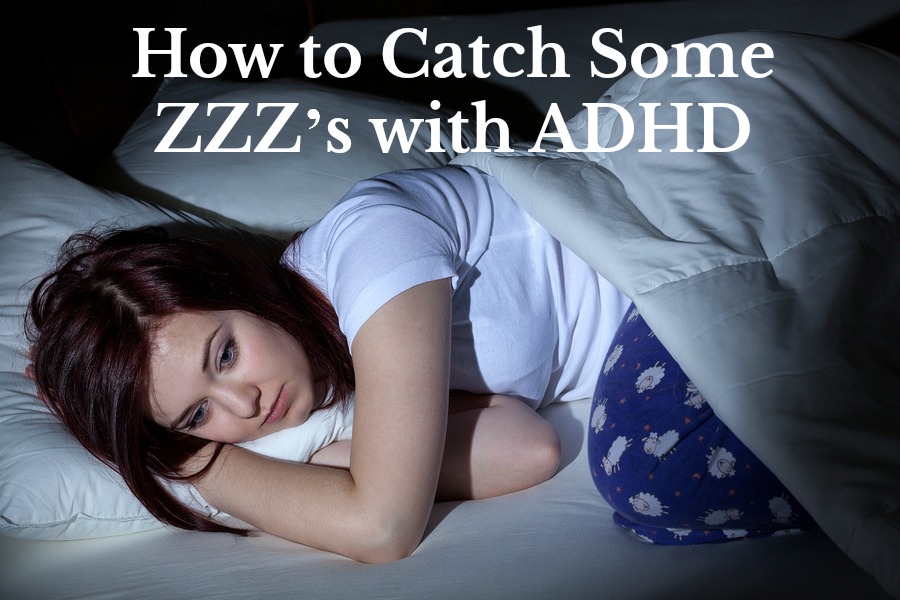When it comes to maintaining your overall health and wellness and improving your mood, sleep plays a vital role. Unfortunately, many people with attention deficit hyperactivity disorder (ADHD) have difficulty shutting their brains down at night, enabling them to fall asleep.

The American Academy of Sleep Medicine (AASM) states that even losing under an hour a night of sleep will affect the academic performance of children with ADHD. It is unfortunate that ADHD itself, along with the medications used to help treat it, can disrupt sleep patterns which makes it difficult to fall asleep and stay asleep.
ADHD is a condition that is characterized by impulsive behavior, inattention, and hyperactivity. It is most often diagnosed in childhood but can continue through adolescence and adulthood. One of the biggest challenges for people with ADHD is being able to wind down for a good night’s sleep. They have trouble shutting their brains down. Trivial thoughts will cross their minds, they will recount events of the day and imagine how they could have done them differently. Eventually, they can become aware that it is getting late and they have yet to get any sleep causing them to feel panicked. The later it gets the more anxious they may become, which in turn makes it more difficult to fall asleep. It’s a vicious cycle.
The good news is we now have a better understanding of the pathophysiology of ADHD and the corresponding neuro-hormonal response to sleep than we once did. We now know of ways that people with ADHD can put falling asleep at night back in their control. Kristin Seymour, MSN, RN, AHCNS, of ADDitude Mag, reviewed the assessments of 31 individuals with ADHD, ages six to 48 years old, 28 of which had problems sleeping and gave them several sleep strategies to try. She states that these individuals all told her that they slept better after implementing her advice. They also noted an improvement in their mood and self-confidence the next day. These are the strategies she recommends:
Keep a regular bedtime every night and wake up at the same time every day.
Children under the age of 10 should have one hour to get ready for bed. Have them lay out their clothes for the next day and/or read a book. For those who take melatonin, the hour will allow for it to start working before they hit the sack. Be sure to get out of bed at the same time every morning. Set multiple alarms, if needed, to get out of bed.
Eliminate caffeine in the afternoon.
Don’t consume any caffeine after 2 p.m. This will allow an ADHD brain to wind down more easily.
Use a white noise machine.
Using a white noise machine, box fan, or vent fan to fall asleep can be very beneficial to people with ADHD. They stimulate dopamine, serotonin, and norepinephrine production helping to restore optimal neuro-hormonal levels without keeping a person awake. They can also drown out distracting noises like creaks in the house or cars passing by.
Turn off electronics.
All devices- TV, iPad, smartphones, computers- should be shut off at least an hour before bedtime. Instead, spend time journaling, reading, or preparing your belongings for school or work the next day.
Use melatonin as a sleep aid.
Seymour states that melatonin is an effective sleep aid, especially when beginning a new medication for ADHD. She states that our bodies produce their own melatonin, but adding 1 mg. to 3 mg. of a melatonin supplement can improve sleep. She will typically give that amount to her daughters with ADHD if they are stressed or wound up on a given day. Remember, you should always ask your pediatrician or general practitioner before taking any new supplement or medication.
Avoid napping.
In past blogs, we have mentioned that napping may be beneficial to some people. However, for those with ADHD, especially teens and adults, this is not the case. Taking an afternoon nap could disturb the circadian sleep pattern they have developed and make it difficult to fall asleep when it’s bedtime.
Sleep is vital to the well-being of everyone, but it is maybe a little more important for those who are diagnosed with ADHD. Hopefully following the above tips will help you or your child on your path to a better night’s sleep. Keep in mind that ADHD can often co-exist with other conditions, including several sleep disorders. If you feel you need more help, please contact the Valley Sleep Center at 480.830.3900 and schedule a sleep consultation at one of our five convenient Valley locations today.

